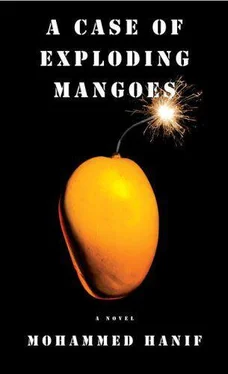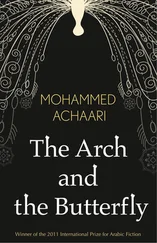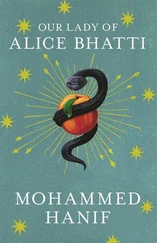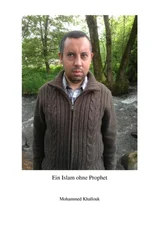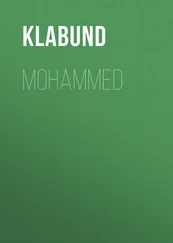General Zia terminated his conversation mid-sentence, put the binoculars to his eyes and searched the horizon. All he could see was a wall of sand. He tried to readjust his binoculars and as the sand began to settle he saw a red banner, the size of a single bed sheet, with a giant hammer and sickle painted on it, fluttering intact over a remote-controlled target-practice vehicle, like a golf cart carrying an advertising banner. The Mi Abram obviously couldn’t see very well. He looked at Arnold Raphel who, with binoculars glued to his eyes, was still searching the horizon optimistically. General Zia wanted to make a joke about the tank being a communist sympathiser but the ambassador didn’t look his way. Other target-practice vehicles started descending the sand dune, bearing other targets: a dummy Indian MiG fighter jet, a gun battery made out of wood and painted a garish pink, a cardboard bunker complete with dummy soldiers.
The Mi Abram’s cannon fired nine more shells and managed to miss every single target. The tank turned towards the observers’ tent, and lowered its barrel again, slowly, as if tired from all the effort. All the generals saluted, the ambassador put his right hand on his heart. The Mi Abram turned back and trundled up the sand dune. The remote-controlled target vehicles, with their dummy targets still intact, started to line up at the base of the sand dune. A gust of desert wind rose from behind the dune, a swirling column of sand danced its way towards the observers’ tent, everybody about-faced and waited for it to pass. As they turned round, shaking the sand off their caps and flicking it off their uniforms, General Zia noticed that the red banner had come loose from its platform on the vehicle and was fluttering away, over the sand dune. Arnold Raphel spoke for the first time. “Well, we got that one. Even if it wasn’t our firepower but this anti-communist desert force.”
There was forced laughter followed by a moment of silence during which everyone heard the faint but unmistakable howling of the desert winds. General Beg took his sunglasses off with an exaggerated gesture. “There is another trial left, sir,” he said, giving a dramatic pause. “Lunch. And then the finest mangoes of the season.” He gestured towards an army truck full of wooden crates. “A gift from All Pakistan Mango Farmers Cooperative. And for today’s lunch, our host is the most respected Chairman of the Joint Chiefs of Staff Committee, General Akhtar.”
The Martyrs’ boulevard dividing the freshly whitewashed garrison mess and the football-field-size lawns in front of it, is full of screaming sirens and Kalashnikov-carrying commandos jumping in and out of open-topped jeeps. Every general with more than two stars on his shoulders is escorted by his own set of bodyguards and heralded by his personal siren song, as if the occasion were not a lunch in their own dining hall but a gladiatorial parade where the one with the most ferocious bodyguards and the shrillest siren will win. The Garrison Commander’s idea of a warm welcome seems to involve whitewashing everything in sight that doesn’t move. The pebbled footpath on the lawns in front of the mess is whitewashed, the wooden benches are painted white, the electricity and telephone polls are gleaming white, even the trunk of the lone keekar tree under which I have lined up my Silent Drill Squad is covered in a dull rustic white.
In this opera of wailing sirens and glinting Kalashnikovs, nobody seems to be bothered about a bunch of cadets at the edge of the boulevard. My boys are slouching on their G$ rifles, trying to scratch their sweat-soaked bodies under starched khaki uniforms without being noticed. The Garrison Commander came to me soon after we disembarked from the truck, the enormity of the occasion seeming to overwhelm him. “I know it’s not a good time but General Akhtar asked for it,” he had said, gesturing towards my boys. “Can you keep it short?” I gave him an understanding smile and said, “Don’t worry, sir. We won’t be keeping him for long.”
The only person who is really pleased to see us is the bandmaster at the head of the military band formation, three rows of overdressed men lined up in the middle of the manicured lawn in front of the mess. After eyeing me for a while he marches up to me with his silver-crested stick, trailing a tartan doublet behind him, a fake red feather quivering in his beret. His face falls in disbelief when I tell him that we don’t need the band to accompany us.
“How are you going to march without a beat?”
“Our drill is silent. It doesn’t require music. And anyway, we are not going to march.”
“You can do it silently but your boys will need our drums to keep the timing. It’ll add beauty to the drill.” Despite his feathers, tartan doublet and bonnet his face is absolutely dry. Not a single drop of sweat. I wonder how he manages that.
I shake my head. “Just a rifle salute. With no commands,” I say, trying to reassure him. “The President will take the salute. Meanwhile your men can rest.” He looks closely at my white-gloved hand upon my scabbard. He looks beyond me towards my boys who are wriggling their toes in their boots in an attempt to keep their blood circulation going, and shakes his head. He looks at me resentfully, as if I have made the whole silent drill thing up to put him out of business, then marches back and raises his stick in the air to signal to his band to start playing. They are probably the only lot more miserable than us, with their tartan shoulder drapes, fur-covered bagpipes and polished brass drums, so shiny you can’t look at them without squinting. But they play on, defying the sun, despite the comings and goings of jittery commandos jumping in and out of the jeeps with their guns pointed at the empty horizon; they play on as if the whitewashed garrison mess with its whitewashed pebbles was the most appreciative audience they have ever found.
The hilt of my sword burns through my white glove. A fine layer of sand has settled on my shoes. I inspect the squad one last time. The boys are alert despite the sweat seeping from under their peaked caps and running down their cheeks. The wooden grips of their Gj rifles are probably melding into the flesh of their hands. We are under the shade of the keekar tree, but its whitewashed trunk doesn’t change the fact that there are more thorns on it than leaves. Its shadow weaves a network of dried branches over a concrete floor marked with white lines for our drill movements. Obaid winks upwards. I look to see if he is pointing at any approaching clouds. Nothing. All I can see is a crow perched on a branch dozing off with its beak tucked under its wings.
Inside the garrison mess the lunch awaits. The brigadiers and the generals have lined up in front of the mess entrance and their commandos have taken up positions on the roof of the surrounding buildings. The bandmaster is getting impatient with his men, his stick dances in the air, apparently asking them to play the same tune over and over again. He throws the stick in the air, catches it and gives me a triumphant look.
General Zia, it seems, is on his way.
I hear the wailing of the sirens before I see the two men on white Yamahas. They are wearing white helmets and ride parallel to each other. General Zia’s convoy is probably behind them but all I can see is spiral after dancing spiral of sand; the storm seems to be chasing these motorcyclists. Oblivious to the whirlwinds that follow in their wake, they drive right up to the entrance of the garrison mess and execute a perfect split, both driving off in opposite directions, their sirens strangled in the middle of a high note.
The convoy of jeeps emerges slowly from the sand that is coming towards us in angry waves. First to arrive are open-topped jeeps with blaring sirens. The howling of the wind and the sirens compete with each other, the sirens dying down as the jeeps reach the entrance of the garrison mess. They deliver their gunmen and move to the car park. Behind the jeeps come two convertible black limousines; the commandos in them belong to a different breed. Wearing battle fatigues and crimson berets, they are not just sitting there cradling their guns; their Uzis are pointing outside, targeting us, the band, the swirling columns of sand. Behind them come three black Mercedes with tinted windows: the first one is flying a US and a Pakistani flag, the second one has a flag that carries the logos of all three armed forces and the third one a Pakistani flag on one side and the Chief of the Army’s on the other. Through the tinted glass of the third Mercedes I catch a glimpse of big white teeth, a jet-black moustache and a hand that is waving to columns of sand dancing on the concrete. A matter of habit maybe, I tell myself, clutching the hilt of my sword. Suddenly it doesn’t feel hot. Hell, it doesn’t even feel like metal. It seems like an extension of my own hand. My own blood is flowing into the metal blade.
Читать дальше
